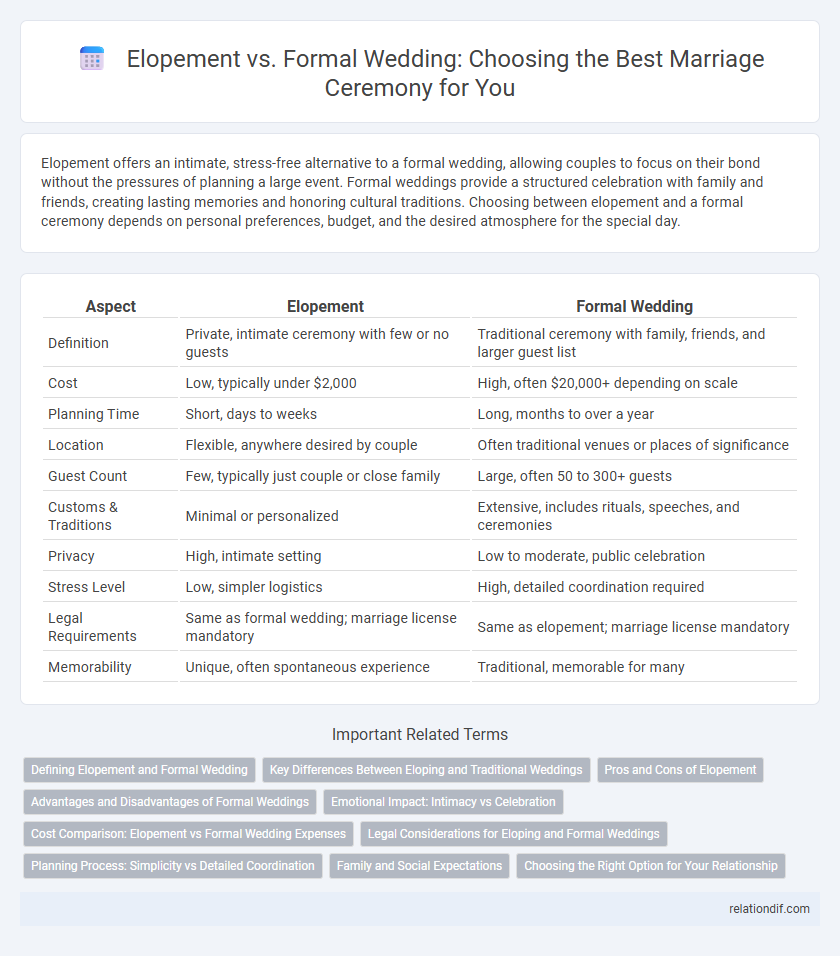Elopement offers an intimate, stress-free alternative to a formal wedding, allowing couples to focus on their bond without the pressures of planning a large event. Formal weddings provide a structured celebration with family and friends, creating lasting memories and honoring cultural traditions. Choosing between elopement and a formal ceremony depends on personal preferences, budget, and the desired atmosphere for the special day.
Table of Comparison
| Aspect | Elopement | Formal Wedding |
|---|---|---|
| Definition | Private, intimate ceremony with few or no guests | Traditional ceremony with family, friends, and larger guest list |
| Cost | Low, typically under $2,000 | High, often $20,000+ depending on scale |
| Planning Time | Short, days to weeks | Long, months to over a year |
| Location | Flexible, anywhere desired by couple | Often traditional venues or places of significance |
| Guest Count | Few, typically just couple or close family | Large, often 50 to 300+ guests |
| Customs & Traditions | Minimal or personalized | Extensive, includes rituals, speeches, and ceremonies |
| Privacy | High, intimate setting | Low to moderate, public celebration |
| Stress Level | Low, simpler logistics | High, detailed coordination required |
| Legal Requirements | Same as formal wedding; marriage license mandatory | Same as elopement; marriage license mandatory |
| Memorability | Unique, often spontaneous experience | Traditional, memorable for many |
Defining Elopement and Formal Wedding
Elopement is an intimate, often spontaneous marriage ceremony typically involving just the couple and a few witnesses, emphasizing privacy and simplicity. Formal weddings are pre-planned events with larger guest lists, extensive arrangements, and traditional rituals reflecting cultural or religious customs. Both approaches offer unique ways to celebrate commitment, tailored to different preferences and values.
Key Differences Between Eloping and Traditional Weddings
Elopement typically involves a private, spontaneous ceremony with minimal guests and lower expenses, while formal weddings often feature extensive planning, larger guest lists, and elaborate celebrations. Traditional weddings include customs, religious rituals, and significant social expectations, contrasting with the intimate, flexible nature of elopements. The key differences lie in scale, cost, personalization, and the level of social engagement each type of ceremony demands.
Pros and Cons of Elopement
Elopement offers a budget-friendly and intimate alternative to traditional weddings by minimizing guest lists and reducing planning stress, allowing couples to focus on their personal commitment. However, it may limit the opportunity to celebrate with family and friends, potentially leading to feelings of exclusion or disappointment among loved ones. While elopement prioritizes simplicity and privacy, it can also result in fewer memories captured in grand settings or fewer cultural and traditional rituals experienced.
Advantages and Disadvantages of Formal Weddings
Formal weddings offer the advantage of creating a memorable, structured event with family and friends, providing a ceremonial atmosphere rich in tradition and elegance. However, they often involve higher costs, extensive planning, and potential stress due to guest management and venue arrangements. The formal setting ensures capturing significant moments but may limit spontaneity compared to elopements.
Emotional Impact: Intimacy vs Celebration
Elopements foster deep emotional intimacy by creating a private, personal experience focused on the couple's connection, free from external pressures or distractions. Formal weddings generate a collective emotional impact through shared celebration, allowing family and friends to partake in the joy and support, enhancing the sense of community. The choice between elopement and formal wedding ultimately shapes whether the emotional experience centers on intimate bonding or expansive social affirmation.
Cost Comparison: Elopement vs Formal Wedding Expenses
Elopements typically cost between $1,000 to $5,000, focusing on intimate ceremonies with minimal expenses for venue, attire, and photography. Formal weddings average $20,000 to $40,000, factoring in a large guest list, elaborate venues, catering, decorations, and entertainment. Choosing an elopement significantly reduces financial burden while maintaining meaningful matrimonial experiences.
Legal Considerations for Eloping and Formal Weddings
Eloping often requires fewer legal formalities, typically needing only a marriage license and an authorized officiant, making it a quicker process compared to formal weddings. Formal weddings must comply with state-specific marriage laws, including obtaining a license, meeting residency requirements, and often involve witnesses, all documented for legal validation. Couples should verify local regulations to ensure their marriage is legally recognized, regardless of choosing an elopement or traditional ceremony.
Planning Process: Simplicity vs Detailed Coordination
Elopement planning emphasizes simplicity, requiring minimal coordination and allowing couples to quickly arrange their ceremony often with just a few essentials like a venue and officiant. Formal weddings demand detailed coordination involving multiple vendors, guest management, and extensive timelines to ensure every aspect is meticulously organized. This contrast highlights how elopements streamline the planning process while formal weddings necessitate comprehensive preparation to execute the event flawlessly.
Family and Social Expectations
Elopement bypasses traditional formal wedding ceremonies, often challenging family and social expectations by prioritizing intimacy and personal choice over public approval. Formal weddings typically serve as a social gathering that reinforces family bonds and cultural traditions, meeting communal expectations of celebration and legitimacy. Couples who choose elopement may face pressure or disappointment from relatives expecting a conventional ceremony, highlighting the tension between personal desires and societal norms.
Choosing the Right Option for Your Relationship
Elopement offers an intimate and spontaneous way to celebrate love, ideal for couples valuing privacy and simplicity over tradition. Formal weddings provide structured ceremonies rich with cultural rituals and opportunities to involve family and friends, appealing to those seeking a grand celebration. Assessing personal values, budget constraints, and desired guest experience helps determine whether elopement or a formal wedding best suits your relationship goals.
Elopement vs Formal Wedding Infographic

 relationdif.com
relationdif.com